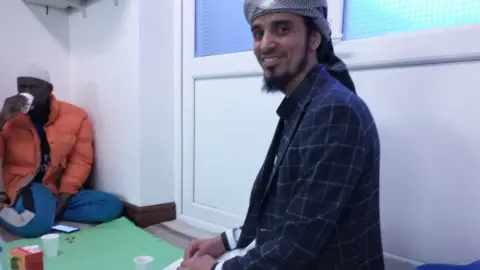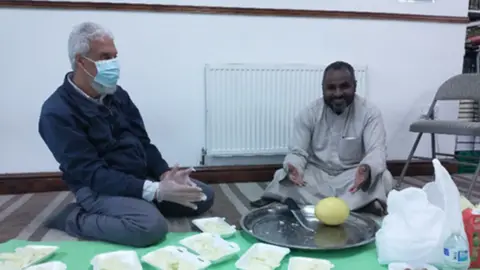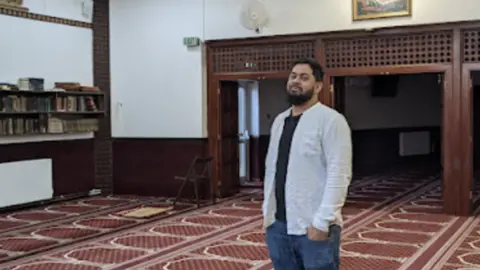Ramadan: Cost of living stops Muslims observing
 BBC
BBCSome Muslims have been unable to fully observe Ramadan because of the soaring cost of living.
Over the past month, about 55,000 Muslims in Wales have been fasting during daylight hours and attending an extra prayer at night.
But one cab driver said higher fuel and food bills has meant he's been forced to miss prayers because he's working extra shifts to earn more money.
"Ramadan has never ever been like this for me," said Nesaor Ali.
"Family and prayer should be my only focus this Ramadan," he said. "But I will have to sacrifice the time with my wife, kids and prayer just so I can bring home an income."
The practice of fasting during Ramadan does not begin until the teenage years and children are not expected to fast. If Muslims choose to fast, they eat twice a day: before the sun rises and when the sun sets.
In the evening, they are encouraged to eat iftar dinners with extended family, friends and members of their community.
But the rising cost of living for families has meant feeding immediate family members more challenging and hosting communal iftar dinners even more difficult.
Mr Ali, 48, works seven days a week to make ends meet.
"Ramadan has never ever been like this for me," he said. "The 2008 recession was hard, but now everything has gone up."
He estimated his gas costs will rise from £560 to £912 this year, and electricity will go from £713 to £1,011.
"I can still make a living and continue to support my family, but unfortunately Ramadan has been affected," he said. "We will still observe the month as best we can, but it's more challenging than ever before."
Mosque leader Sheikh Imam Ahmed Ali said there were fewer Muslims attending prayers.
"People are coming from Ely and Llandaff, and are willing to save their income to pay for essential expenditures such as utility bills since the prices have gone up.
"Food bank attendees are asking for more days of food banks to be open in order to compensate for the money they are spending on their utility bills."
'Watching my spending'
One student said the idea of saving by fasting during Ramadan was now a "myth" because of increases in her spending.
The woman, who studies at Cardiff University, explained how her food bills have gone up.
"A few months ago, five breasts of chicken from the Halal butcher would cost me £7, now it is nearly £9. I am told that to store food in freezers consumes energy so it makes sense the selling prices will go up as the shop's energy bills go up.
"I am watching my spending now. I will eat more baked beans."
Food price rises have also had an impact on Muslim-run food banks.
Imam Ali, 36, came to Wales from Yemen as a child and now volunteers with Al-Ikhlas, a combined food bank and Mosque based in Adamsdown, Cardiff.
He said he was really surprised at the level of poverty in the UK.
"When I was a child in Yemen, I thought we will find no hunger in the UK.
"Then I arrived to find some poor people. It's a very westernised country, very developed, yet there is still poverty."

Ahmed Tahar, the catering manager of the Al-Ikhlas, said he has seen a sharp increase in demand for food parcels.
He explained: "We are feeding many Muslims in Wales, and around 50 white Welsh people [per week] who are struggling to afford food.
"A food parcel costs us around £25 a week and we rely on donations."
He said he was concerned about how sustainable their food bank will be over the coming months.
"Can we keep food parcel production up? If the donations do not increase or continue, we will be in trouble."

"Muslims in Wales are generally on the lower end of the socio-economic ladder," said Dr Abdul-Azim Ahmed, the Secretary-General of the Muslim Council of Wales.
He said it means Muslim households are being disproportionally affected by the current cost of living crisis.
"We know from research that Muslims face the most difficult job market of all minority groups," he said. "As a consequence of energy price increase in the past month, and food cost increases over the last few years, it's been very challenging for some Muslims households to be able to pay the bills."
